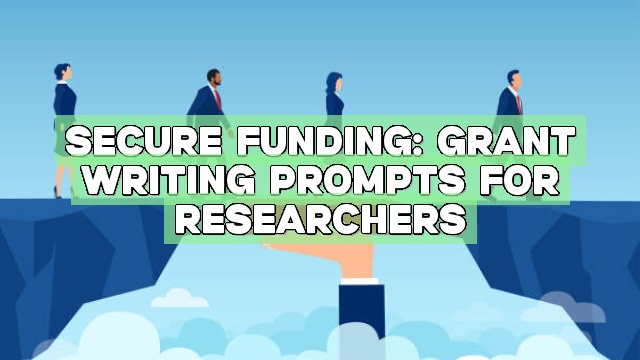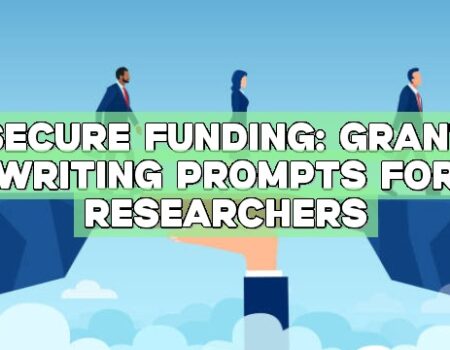Securing funding is crucial for researchers to carry out their research endeavors. Grant writing is an essential skill that helps researchers to secure funding for their research projects. In this article, we will discuss the importance of grant writing prompts for researchers, the grant writing process, and how to craft an effective research statement.
Key Takeaways:
- Grant writing is crucial for researchers to secure funding for their research projects.
- Grant writing prompts assist researchers in articulating their research needs effectively.
- An effective research statement is crucial in grant applications.
Understanding the Grant Writing Process
Grant writing can be a complex and daunting task for many researchers. However, understanding the process and utilizing prompts can make it easier to articulate research needs effectively and secure funding. Here are the essential steps involved in the grant writing process:
- Identify the funding opportunity: Before beginning the grant writing process, it is essential to identify a funding opportunity that aligns with your research interests and goals. Utilize online databases, professional associations, and funding agencies to find suitable grants.
- Research the funder: Once you have identified a funding opportunity, research the funder to understand their mission and priorities. This research will help you tailor your proposal to align with their interests and increase your chances of success.
Grant Writing Prompts
Here are some prompts that can help you navigate the grant writing process:
“What is the funding opportunity, and how does it relate to my research interests and goals?”
“What is the funder’s mission and values, and how can I align my proposal with them?”
By answering these questions, you can develop a clear understanding of the grant writing process and craft a persuasive and compelling proposal that aligns with the funder’s interests.
Crafting Effective Research Statements
One of the most important components of a successful grant proposal is a clear and compelling research statement. This statement should succinctly articulate the research problem, the objectives of the proposed research, and the methodology to be used to address the problem.
Effective research statements not only demonstrate the significance and feasibility of the proposed research but also showcase the expertise and experience of the researcher(s) in the relevant field. To craft an impactful research statement, researchers can use the following prompts:
- What is the research problem or question that you aim to address through this study?
- Why is this problem or question significant, and what is the potential impact of your research?
- What are the specific research objectives, and how will you address them?
- What methodology will you use, and why is it appropriate for this research?
- What are the potential challenges or limitations of your research, and how will you mitigate them?
Answering these prompts will help researchers clearly articulate their research goals and methods and emphasize the significance and feasibility of their research. However, it’s essential to avoid technical jargon or overly complex language and instead, write in a clear and concise manner that can be easily understood by grant reviewers who may not be experts in the field.
Moreover, the research statement should align with the overall theme of the grant proposal and connect to other sections such as the budget, methodology, and supporting documentation. By crafting a well-written and effective research statement, researchers significantly increase their chances of securing funding for their research endeavors.
Identifying Funding Opportunities
Once you have a clear understanding of the research you want to conduct, it’s time to look for funding opportunities that align with your research goals. It’s important to note that the process of identifying suitable funding opportunities can be time-consuming and competitive. However, with the right prompts and strategies, you can increase your chances of finding the right funding source for your research project.
Utilize Grant Databases and Search Engines
One of the most effective ways to identify potential funding opportunities is by using grant databases and search engines. These resources allow you to search for grants based on specific criteria, such as research focus, eligibility, and funding amount. Some popular grant databases and search engines include:
| Grant Databases and Search Engines | Description |
|---|---|
| Grants.gov | A comprehensive database of federal grants, featuring over 1,000 grant programs from 26 federal grant-making agencies. |
| Foundation Center | A database of private and corporate foundations, offering information on funding opportunities, grantmakers, and grant recipients. |
| Pivot | A database of funding opportunities from federal, non-profit, and private organizations, featuring over $70 billion in funding. |
By using these databases, you can quickly and easily identify funding opportunities that match your research needs, saving you time and effort in your search.
Attend Workshops and Conferences
Attending workshops and conferences related to your research field can provide valuable insights into funding opportunities and how to apply for them. These events often feature speakers from funding agencies, who can offer tips and guidance on how to create a successful grant proposal. Additionally, networking with peers and colleagues can help you stay informed about new funding opportunities and potential collaborations.
Contact Funding Agencies and Program Officers
Don’t be afraid to reach out to funding agencies and program officers directly. They can provide valuable guidance on funding opportunities and offer feedback on your grant proposal. Program officers can also help you determine whether your research aligns with the funding agency’s priorities and can help you tailor your proposal accordingly.
By utilizing these strategies and prompts, you can identify suitable funding opportunities for your research project and increase your chances of securing funding.
Structuring a Grant Proposal
A grant proposal is a formal document that outlines a researcher’s research project and request for funding. A well-structured grant proposal is key to securing funding. To ensure proposals are properly organized, researchers must include the following sections:
- Abstract: This section provides a brief summary of the research project and its relevance.
- Introduction: This section introduces the research project, identifying the problem or issue being addressed.
- Literature Review: This section demonstrates the researcher’s knowledge of the existing literature on the topic and how their research project extends or adds to the current knowledge.
- Methodology: This section outlines how the research will be conducted, including data collection and analysis methods.
- Expected Results: This section describes the expected outcomes of the research project.
- Discussion and Conclusion: This section provides a summary of the research project and its importance, as well as details on how the research outcomes will be disseminated.
- Bibliography: This section provides a list of references cited throughout the proposal.
When structuring a grant proposal, it is important to ensure that the proposal is well-organized, easy to read, and visually appealing. Use headings, subheadings, and lists to break up the text and make the proposal easier to navigate. Additionally, ensure that the proposal follows the specific guidelines of the funding organization.
Below are some additional prompts to help researchers structure their grant proposals effectively:
- Use clear, concise language that is accessible to a wide audience.
- Ensure that the proposal is sufficiently detailed and addresses all aspects of the research project.
- Highlight the significance and potential impact of the research project.
- Include a detailed timetable outlining key project milestones.
- Consider collaborating with other researchers or organizations to boost the proposal’s credibility and enhance the research project’s potential impact.
By following these prompts and structuring their grant proposals effectively, researchers can increase their chances of securing funding for their research projects.
Highlighting Research Impact and Significance
One of the most critical components of a successful grant proposal is demonstrating the impact and significance of the proposed research. Funders want to invest in research that will make a meaningful difference in the world, and it’s up to the researcher to convince them that their project is worth supporting. As such, it’s essential to craft a research statement that clearly outlines the proposed objectives, methods, and expected outcomes, as well as the implications of the research for the field and society at large.
Prompt: Describe the potential impact of your research in terms of its significance for the field and its potential benefits for society.
One effective way to highlight the impact and significance of your research is to situate it within existing scholarly conversations and demonstrate how it contributes to advancing knowledge. This involves not only discussing the novelty and innovation of the research but also building a compelling case for why it matters. This might include discussing potential applications of the research, implications for policy or practice, or broader societal implications.
Prompt: Situate your research within existing scholarly conversations and demonstrate how it contributes to advancing knowledge. What are the potential applications or implications of your research?
Along with outlining the significance of the research, it’s essential to demonstrate that the project is feasible and has a clear pathway to impact. This involves not only outlining the research methods and procedures but also detailing how the findings will be disseminated and translated into practice. Researchers should consider the long-term sustainability of the project and how it aligns with current funding priorities.
Prompt: Outline the proposed methodology and expected outcomes of the research and discuss how the findings will be disseminated and translated into practice. How does the project align with current funding priorities?
To effectively highlight the impact and significance of research, it’s important to use clear and accessible language that resonates with the broader public. Funders want to invest in research that has tangible benefits for society, so researchers should consider how their work speaks to a wider audience and why it matters beyond the academic world.
Prompt: Describe your research in language that is accessible to a broader public and discuss why it matters beyond the academic world.
Addressing Methodology and Feasibility
One of the critical aspects of grant writing is outlining your research methodology and demonstrating feasibility. The methodology should be detailed and clearly communicate how you plan to conduct the research and gather data. Additionally, you must show that your research objectives are achievable within the allotted timeframe and budget.
When discussing methodology, consider:
- The research design and approach: Will you use a qualitative or quantitative approach? How will you collect and analyze data? How will you control for bias and ensure accuracy?
- Sample size and selection: Who will participate in your study? How will you recruit participants? What are your inclusion and exclusion criteria?
- Data analysis: What statistical methods will you use to analyze the data? Have you considered potential limitations or challenges in your analysis?
It is also essential to demonstrate the feasibility of your research. This includes showing that your research objectives can be achieved within the funding timeframe and budget. Consider:
- Anticipating any challenges that may arise from your research design, such as recruitment or data collection difficulties.
- Providing detailed timelines for each stage of your research project, including data collection, analysis, and dissemination.
- Providing a clear budget breakdown, including justification for expenses and how the funds will be used.
By demonstrating a clear understanding of your research methodology and outlining the feasibility of your project, you can strengthen your grant proposal’s chances of success. Use prompts to guide you through the process, including:
- Developing a detailed research design and approach
- Anticipating potential challenges and developing contingency plans
- Providing comprehensive timelines for each stage of your project
- Demonstrating clear budget justification and financial planning
Structuring a Grant Proposal
Grant proposals typically have a structure that follows a specific format and includes essential components that funders expect to see. The following prompts can help researchers structure their grant proposals:
| Grant Proposal Component | Prompts |
|---|---|
| Title | What is the title of your project? |
| Abstract/Summary | What is the overview of your research project? |
| Introduction/Background | What is the problem or opportunity that your research addresses? |
| Research Questions/Hypotheses | What are the specific questions or hypotheses that your research aims to answer? |
| Methodology | What are the methods that you will use to carry out your research? |
| Timeline | What are the key milestones and dates for your project? |
| Expected Outcomes/Impact | What are the expected outcomes and impact of your research? |
| Budget and Financial Plan | What are the costs associated with your research, and how much funding do you require? |
| References/Citations | What are the sources that you have consulted for your research? |
By addressing these components and utilizing prompts to guide their writing, researchers can effectively structure their grant proposals to meet the requirements of funders and increase their chances of securing funding.
Supporting Documentation and Collaborations
Grant applications often require supporting documentation to accompany the proposal. This documentation can include letters of support, biosketches, and other materials that demonstrate the expertise and capacity of the research team. Collaborations with other institutions or researchers may also strengthen the proposal.
When preparing supporting documentation, researchers should ensure that each document aligns with the proposal’s objectives and provides evidence to support the proposed research. Letters of support should come from reputable individuals or organizations that have a vested interest in the research. Biosketches should highlight the qualifications and accomplishments of the research team.
Collaborations can also enhance the strength of a proposal. By partnering with other researchers or institutions, researchers can demonstrate a wider reach and a more robust research agenda. Collaborations should be carefully considered and developed with the intention of creating a mutually beneficial partnership.
Overall, supporting documentation and collaborations can greatly enhance the strength of a grant proposal. By thoughtfully preparing this documentation and strategically building collaborations, researchers can increase the chances of securing funding for their research endeavors.
Reviewing and Revising Grant Proposals
Grant proposal writing is an iterative process that requires multiple revisions to ensure that the proposal meets the requirements of the funding agency and clearly articulates the research needs.
After drafting the initial proposal, researchers should take time to review and revise their work. Here are some prompts to guide the revision process:
- Revise for clarity: Ensure that the proposal is clear and concise and avoid using technical jargon that the reviewers may not understand. Ask a colleague to read the proposal and provide feedback on the clarity of the writing.
- Check for consistency: Ensure that all sections of the proposal are consistent and that the language used throughout the proposal is uniform. Minor inconsistencies may indicate a lack of attention to detail, which could hurt the chances of receiving funding.
- Review for relevance: Ensure that the proposal is relevant to the funding agency’s goals and objectives. Reviewers are more likely to fund research that aligns with their mission and priorities.
- Verify accuracy: Double-check all facts and figures to ensure that they are correct. Any inaccuracies or errors could undermine the credibility of the proposal.
- Seek feedback: Seek feedback from colleagues and mentors to improve the quality of the proposal. Incorporate their feedback into the proposal to strengthen the research proposal.
- Review the formatting: Ensure that the proposal adheres to the formatting guidelines provided by the funding agency. Noncompliance with formatting guidelines could lead to rejection of the proposal without review.
- Proofread: Finally, proofread the proposal for spelling and grammatical errors. These errors seem minor, but they can create a negative impression of the researcher’s attention to detail.
By reviewing and revising the proposal based on these prompts, researchers can improve the overall quality of the proposal and increase the chances of securing funding.
Success Stories and Best Practices
Securing funding through grant writing can be a challenging and competitive process for researchers. However, with the right approach and effective use of prompts, success stories show that it is entirely possible to achieve funding goals. Here are some best practices to inspire and guide aspiring grant writers:
Develop a Clear and Compelling Narrative
One of the critical aspects of successful grant writing is developing a clear and compelling narrative that effectively communicates the importance and impact of the proposed research. This involves utilizing prompts to craft effective research statements, as well as highlighting research impact and significance. By doing so, researchers can create a compelling story that resonates with grant reviewers and increases their chances of securing funding.
Collaborate and Seek Feedback
Collaborating with other researchers and seeking feedback on grant proposals can be tremendously helpful in improving the quality of the proposal. This includes identifying potential collaborators, as well as seeking feedback from peers and advisors. By doing so, researchers can identify weaknesses in their proposals and make necessary revisions to improve their chances of success.
Submit Early and Revise
Submitting grant proposals early and allowing ample time for revisions is essential to increase the chances of success. This involves utilizing prompts to structure proposals effectively, addressing methodology and feasibility, and ensuring comprehensive budgeting and financial planning. By submitting early, researchers can also take advantage of feedback from reviewers and address any issues that arise before the final submission deadline.
Stay Persistent and Persevere
Finally, it is essential to stay persistent and persevere throughout the grant writing process. Grant writing can be a challenging and time-consuming undertaking, but success stories show that with the right approach and effective use of prompts, it is entirely possible to secure funding for research endeavors. By staying persistent and maintaining a positive attitude, researchers can increase their chances of success and achieve their funding goals.
In conclusion, grant writing prompts can be a valuable tool for researchers looking to secure funding for their research endeavors. By utilizing the prompts provided and following best practices, researchers can develop clear and compelling narratives, collaborate effectively, submit strong proposals early, and stay persistent throughout the process. With the right approach and determination, success in grant writing is entirely achievable.
FAQ
Q: What are grant writing prompts?
A: Grant writing prompts are specific questions or prompts designed to help researchers effectively articulate their research needs, goals, and impact in grant applications.
Q: Why are grant writing prompts important?
A: Grant writing prompts are important because they guide researchers in organizing their thoughts and ideas, ensuring that they address all the necessary components of a grant application and increase their chances of securing funding.
Q: How can researchers use grant writing prompts?
A: Researchers can use grant writing prompts by carefully considering each prompt and responding to it in a thoughtful and concise manner. By addressing the prompts, researchers can effectively communicate their research objectives and the significance of their work to potential funders.
Q: Can grant writing prompts be customized?
A: Yes, grant writing prompts can be customized to fit the specific requirements of different grant applications. Researchers can adapt and modify prompts to reflect their unique research goals and objectives.
Q: Where can researchers find grant writing prompts?
A: Grant writing prompts can be found in various resources such as grant application guidelines, grant writing workshops, online grant writing courses, and grant writing books. Researchers can also seek assistance from grant writing professionals or consultants.
Q: How do grant writing prompts help in securing funding?
A: Grant writing prompts help in securing funding by guiding researchers to effectively communicate the value and impact of their research. By addressing the prompts, researchers can provide funders with a clear understanding of their research objectives, methods, and potential outcomes.
Q: What is the role of grant writing prompts in crafting compelling research statements?
A: Grant writing prompts play a crucial role in crafting compelling research statements by prompting researchers to clearly articulate the significance, objectives, and potential impact of their research. These prompts encourage researchers to provide concise and persuasive statements that capture the attention of grant reviewers.
Q: Can grant writing prompts be used for other types of writing?
A: While grant writing prompts are specifically designed for grant applications, they can also be useful for other types of writing such as research proposals, academic papers, and project reports. The prompts help researchers organize their thoughts and articulate their ideas effectively.









